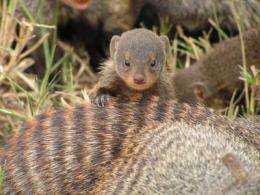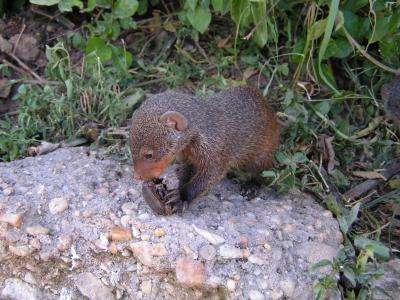Mongoose traditions shed light on evolution of human culture

A groundbreaking study of banded mongooses in Uganda has shown even small-brained animals pass on traditions, giving a valuable insight into how complex human culture could have evolved.
Scientists from the University of Exeter's School of Biosciences studied five groups of banded mongooses, one of them made famous in the BBC TV series Banded Brothers: The Mongoose Mob. Their pioneering research observed the animals passing on traditions (namely foraging preferences) from one generation to the next, a practice previously thought to be reserved only to humans and the most intellectually advanced animals, such as primates and dolphins.
Dr Corsin Müller, lead author of the study, said the findings showed for the first time that less-advanced animals pass on traditions in the wild, which has important implications for understanding how culture can develop. He said: "We've shown that the basic mechanism for traditions is already found in animals of very average intellect, like mongooses. If they pass on traditions, there's no reason to suspect most other animals wouldn't have traditions too. This is a starting point at which traditions could evolve to become more complex and gives us an insight into how our cultures may have begun. It's a point from which our behaviour could have evolved."
Mongooses are better known for their unique social system which means biological parents contribute little to the raising of their young. Instead pups pick out an adult, such as an older sibling, cousin, or uncle, to be their "escort" through infancy. The pair will then spend most of their time together, with the escort caring for the young pup until it can be independent.
This led Dr Müller to wonder whether the escort was passing on traditions to their pup. Together with Dr Michael Cant, also of the University of Exeter, he devised research which would test the tradition theory by taking advantage of another mongoose trait, namely their varied eating habits.
It's generally known that when eating prey with hard-shells, such as eggs or beetles, mongooses either bite through the outer shell or smash it on a hard surface. Each technique is equally efficient, so it's seen as a preference. Most will stick exclusively to one method, while others may switch between the two.

For the University of Exeter research, the team created an artificial prey consisting of a plastic egg with rice and fish packed inside. By using this, Dr Müller and Dr Cant were able to monitor how 42 banded mongoose pups picked up their approach to this new item from their escorts.
According to the research, escorts stuck to their preferred method of biting or smashing, while a handful completely ignored the plastic eggs — with their preference being observed by the pups. Two months later, when the escort relationship had ended and the pups were fending for themselves, the youngsters generally followed the biting, smashing or ignoring behaviour they picked up from their escort. Even one year on, the smashers and the biters continued to preferentially display the learned behaviour.
Dr Müller added: "Our research adds to growing evidence that features which were long thought to be uniquely human actually are found, in basic forms, in animals. This is not only in our closest relatives, but even in an unspectacular animal like mongooses.
"This doesn't make humans any less special, but it does give us an insight into how our own peculiar behaviour could come about. Humans are still unique, as is any other species."
More information: The paper appeared in Current Biology: doi:10.1016/j.cub.2010.04.037
Provided by University of Exeter

















